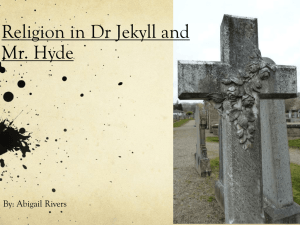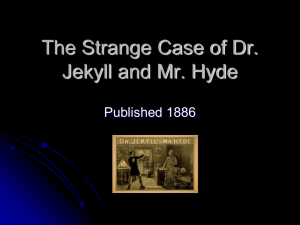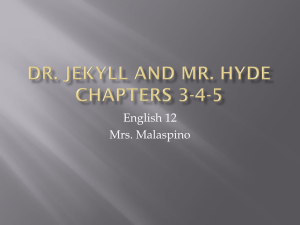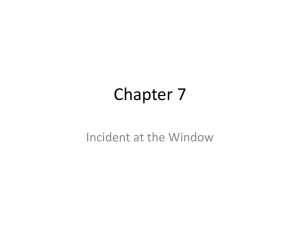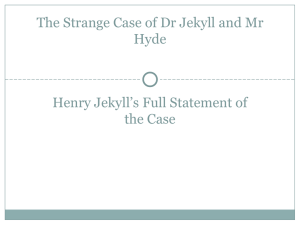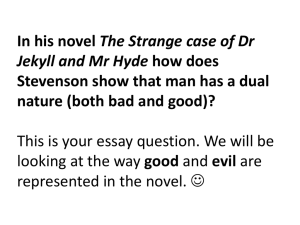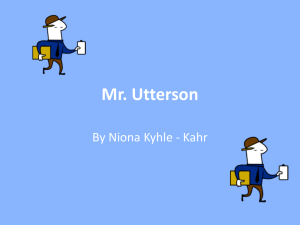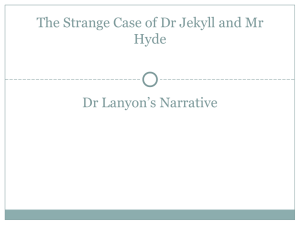Group5PM
advertisement
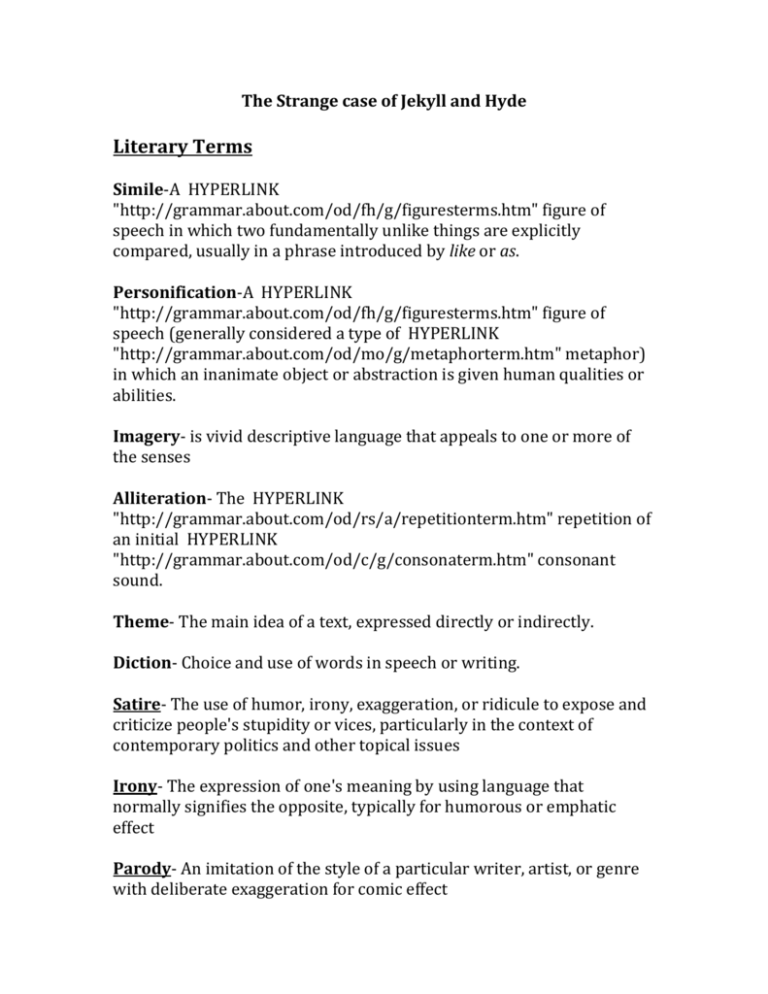
The Strange case of Jekyll and Hyde Literary Terms Simile-A HYPERLINK "http://grammar.about.com/od/fh/g/figuresterms.htm" figure of speech in which two fundamentally unlike things are explicitly compared, usually in a phrase introduced by like or as. Personification-A HYPERLINK "http://grammar.about.com/od/fh/g/figuresterms.htm" figure of speech (generally considered a type of HYPERLINK "http://grammar.about.com/od/mo/g/metaphorterm.htm" metaphor) in which an inanimate object or abstraction is given human qualities or abilities. Imagery- is vivid descriptive language that appeals to one or more of the senses Alliteration- The HYPERLINK "http://grammar.about.com/od/rs/a/repetitionterm.htm" repetition of an initial HYPERLINK "http://grammar.about.com/od/c/g/consonaterm.htm" consonant sound. Theme- The main idea of a text, expressed directly or indirectly. Diction- Choice and use of words in speech or writing. Satire- The use of humor, irony, exaggeration, or ridicule to expose and criticize people's stupidity or vices, particularly in the context of contemporary politics and other topical issues Irony- The expression of one's meaning by using language that normally signifies the opposite, typically for humorous or emphatic effect Parody- An imitation of the style of a particular writer, artist, or genre with deliberate exaggeration for comic effect Dystopia- An imagined place or state in which everything is unpleasant or bad, typically a totalitarian or environmentally degraded one Atmosphere- Atmosphere is the mood or persistent feeling implied by a literary work. An author establishes atmosphere partly through description of setting and partly by the objects chosen to be described. Metaphor- a figure of speech in which a word or phrase is applied to a person, idea, or object to which it is not literally applicable. It is an implied analogy or unstated comparison which imaginatively identifies one thing with another. This device is used by an author to turn or twist the meaning of a word. Characters Dr. Henry Jekyll - A respected doctor and friend of both Lanyon, a fellow physician, and Utterson, a lawyer. Jekyll is a seemingly prosperous man, well established in the community, and known for his decency and charitable works. Since his youth, however, he has secretly engaged in unspecified dissolute and corrupt behavior. Jekyll finds this dark side a burden and undertakes experiments intended to separate his good and evil selves from one another. Through these experiments, he brings Mr. Hyde into being, finding a way to transform himself in such a way that he fully becomes his darker half. Mr. Edward Hyde - A strange, repugnant man who looks faintly prehuman. Hyde is violent and cruel, and everyone who sees him describes him as ugly and deformed—yet no one can say exactly why. Language itself seems to fail around Hyde: he is not a creature who belongs to the rational world, the world of conscious articulation or logical grammar. Hyde is Jekyll’s dark side, released from the bonds of conscience and loosed into the world by a mysterious potion. Mr. Gabriel John Utterson - A prominent and upstanding lawyer, well respected in the London community. Utterson is reserved, dignified, and perhaps even lacking somewhat in imagination, but he does seem to possess a furtive curiosity about the more sordid side of life. His rationalism, however, makes him ill equipped to deal with the supernatural nature of the Jekyll-Hyde connection. While not a man of science, Utterson resembles his friend Dr. Lanyon—and perhaps Victorian society at large. Plot Summary: The story begins with a chilling flashback of a memory of Mr. Hyde. The lawyer (Mr. Utterson) present recalls a time when he witnessed Mr. Hyde run over a young girl and not offer anything but money. This is the first time the reader is introduced into what Mr. Hyde is and what he will become. Some time later Mr. Utterson receives Dr. Jekyll’s will witch says that in the case of his disappearance or death everything will be given to Hyde. A considerable time later, a prominent politician is brutally beaten to death. A maid, who points to Mr. Hyde as the culprit, conveniently witnesses the murder. Everyone tries to hunt down Hyde, but they cannot find him anywhere. Meanwhile, Dr. Jekyll is in great health and spirits and just as chipper as usual. Two months later, both Dr. Lanyon (a good friend of Jekyll) and Dr. Jekyll fall terribly ill, and claim to have fought with each other. Dr. Lanyon dies, leaving mysterious documents in Mr. Utterson’s possession, to be opened only if Dr. Jekyll dies or disappears. Dr. Jekyll remains hidden while he is “sick”, despite frequent visits from Mr. Utterson. Finally, one evening, Dr. Jekyll’s butler visits Mr. Utterson at home. He’s worried about his master and is convinced of foul play. The butler persuades Mr. Utterson to return to Dr. Jekyll’s house, where they break into Dr. Jekyll’s laboratory. They find Mr. Hyde dead on the floor, with Dr. Jekyll nowhere to be found. After a while Dr. Jekyll’s buttler and long time friend becomes worried and sends for Mr. Utterson. When they break into the lab they discover dead body of Hyde, but Jekyll is nowhere to be found. The reader discovers (through the documents left by the dead men) the following: by means of a potion, Dr. Jekyll was able to transform into Mr. Hyde and give in to a world of pleasure and selfserving crime. In his narrative, Dr. Jekyll writes that Mr. Hyde became ever more powerful and ever harder to control – in essence, the dominant personality won in the end.
